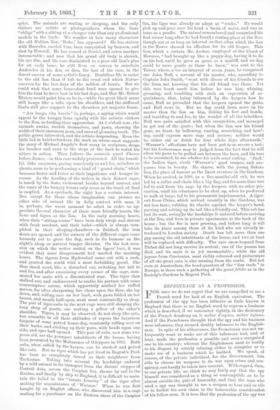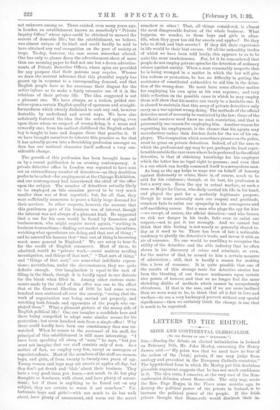ESPIONNAGE AS A PROFESSION. F OR once we do not regret
that we are compelled to use a French word for lack of an English equivalent. The profession of the spy has been hitherto BO little known in England that there is no English word to express a business which is described, if we remember rightly, in the dictionary of the French Academy as, Is vatier (region, metier infame. And if the Frenchman thought that the spy and his business were infamous, they seemed doubly infamous to the English- man. In spite of his abhorrence, the Frenchman was not nn- frequently wont to make use of this infamous tool, and, at least, made the profession a possible and even a recognised one in his country ; whereas the Englishman used to testify to his disgust by utterly refusing either to recognise or to make use of a business whicb he loathed. We speak, of course, of the private individual, for the Government, less able to choose its weapons in its war upon crime and con- spiracy, can hardly be taken into account. With regard, then, to our private life, we think we may fairly say that the spy himself was considered as a thing so contemptible as to be almost outside the pale of humanity, and that the man who used a spy was thought to use a weapon so base and so vile as to forfeit his own claim to the honourable consideration of his fellow-men. It is true that the profession of the spy was
not unknown among us. There existed, even many years ago, in London an establishment known as somebody's "Private Inquiry Office," where spies could be obtained to unravel the secrets cif domestic life ; but the establishment, we believe, was almost unique of its kind, and could hardly be said to have obtained any real recognition on the part of society at large. To-day, however, the case seems somewhat altered. One has only to glance down the advertisement-sheet of more than one morning paper to find not one but a dozen advertise- ments of Private Detective Offices, where spies are provided for any purpose that their patrons may require. Whence• we draw the natural inference that this plentiful supply has grown up in response to a corresponding demand, and that English people have so far overcome their disgust for the metier infame as to make a fairly extensive use of it in the relations of their private life. The idea suggested is not a pleasant one. We have always, as a nation, prided our- selves upon a certain English quality of openness and straight- forwardness which utterly disdained to seek any end, however desirable, by underhand and secret ways. We have also sedulously fostered the idea that the action of spying, even upon those whom we suspect of wrong-doing, is a mean and cowardly one; from his earliest childhood the English school- boy is taught to hate and despise those that practise it. If we have brought ourselves to tolerate this practice so far that it has actually grown into a flourishing profession amongst us, then has our national character itself suffered a very con- siderable change.
The growth of this profession has been brought home to us by a recent publication in an evening contemporary. A private detective office in London was reported to have sent out an extraordinary number of detectives—as they doubtless prefer to be called—for employment at the Chicago Exhibition, and our contemporary had interviewed the chief of the office upon the subject. The number of detectives actually likely to be employed on this occasion proved to be very much smaller than was at first reported ; but, for all that, they were sufficiently numerous to prove a fairly large demand for their services. In other respects, however, the account that this gentleman gave of his business was of interest, though the interest was not always of a pleasant kind. He suggested that a use for his men would be found by financiers and business-men, who might require secret agents, "working in business transactions,—finding out market secrets, inventions, watching what speculators are doing, and that sort of thing ; " and he assured his hearers that "that sort of thing is becoming much more general in England." We are sorry to hear it, for the credit of English commerce. Most of them, he admitted, would do "private work,—social matters needing investigation, and things of that sort." "That sort of thing," and "things of that sort," are somewhat indefinite expres- sions; nevertheless, under the circumstances, they are quite definite enough. Our imagination is equal to the task of filling in the blank, though it is hardly equal to our distaste for the blank when filled in. Among other curious state- ments made by the chief of this office was one to the effect that at the General Election of 1886 he had some seven hundred men scattered all over the country, "seeing that the work of organisation was being carried out properly, and watching both friends and opponents of the people who em- ployed them." What a Pleasant picture of the seamy side of English political life 1 One can imagine a candidate here and there being compelled to adopt some similar means for his protection; but seven hundred men from a single office ! Why there could hardly have been one constituency that was un- watched. When he comes to the personnel of his staff, the principal of this establishment is still more interesting. "I have been speaking all along of 'men,'" be says, "but you must not imagine that our staff consists only of men. As a matter of fact, we employ very few, except as managers or superintendents. Most of the members of the staff are women, boys, and girls, of from twenty to twenty-two years of age. Young women and boys may eat sweets or apples all day, but they don't get drunk and 'blab' about their business. They have a very good time, you know,—not much to do but play draughts or dominoes, walk about, and have plenty of amuse- ment; but if there is anything to be found out on any subject, they are certain to worm it out somehow." Un- fortunate boys and girls I—with not much to do but walk about, have plenty of amusement, and worm out the secret somehow or other ! That, all things considered, is almost the most disagreeable feature of the whole business. What happens, we wonder, to these boys and girls in after- life, when they grow too old for sweets and apples ? Do they take to drink and blab secrets? If they did, their experience in life would be their best excuse. Of all the unhealthy trades of which we have been told lately, this appears to us to he quite the most unwholesome. For, let it be remembered that people do not employ private spies for the detection of ordinary crimes against society. When a man reasonably suspects that be is being wronged in a matter in which the law will give him redress or protection, he has no difficulty in getting the- assistance of constituted authorities to aid him in the detec- tion of the wrong-doer. He must have some ulterior motive for employing his own spies at his own expense; and very little reflection on the possible cases in which he may employ them will show that his motive can rarely be a laudable one. It is absurd to maintain that this army of private detectives only carry on a war against wrong-doing. The methods of the official detective must of necessity be restricted by the law; those of the- unofficial amateur need know no such restriction, and that is presumably one reason for employing him. Another reason for regretting his employment, is the chance that his agents may manufacture rather than disclose facts for the use of his em- ployer. The temptation which sometimes presses on the police, must be great on private detectives. Indeed, of all the uses to- which the professional spy may be put, perhaps the least repre- hensible outside the rare cases where he is preferred to the official detective, is that of obtaining knowledge for his employer which the latter has no legal right to possess ; and even that is a use which can hardly commend itself to a scrupulous man.
As long as the spy helps to wage war on behalf of honesty against dishonesty or crime, there is, of course, much to be said for his existence ; though, at its best, his profession is but a sorry one. Even the spy in actual warfare, or such a, man as Major Le Caron, who daily carried his life in his hand,. and played the part for a perfectly legitimate purpose,. though he mast naturally earn our respect and gratitude, somehow fails to enlist our sympathy in his courageous and self-sacrificing career. But a man who plays the spy for hire —we except, of course, the official detective—and who braves no risk nor danger in his trade, fails even to enlist our respeot,—not to put it too strongly. And we cannot but think that this feeling is not nearly so generally shared to- day as it need to be. There has been of late a noticeable tendency to glorify the detective's trade, and invest it with an air of romance. No one would be unwilling to recognise the utility of the detective and the able industry that he often shows in his discovery of crime and criminals, or even, for the matter of that, to accord to him a certain measure of admiration ; still, that is hardly a reason for making him a hero of romance. It is quite possible that one of the results of this strange taste for detective stories has been the blunting of our former sentiments upon certain nice points of honour, and that we no longer feel the same shrinking dislike of methods which cannot be scrupulously chivalrous. If that is the case, and if we are more incline&. than we were wont to be, to think that all is fair in love and warfare—to use a very hackneyed proverb without any special significance—then we certainly think the change is one that is much to be regretted.



































 Previous page
Previous page